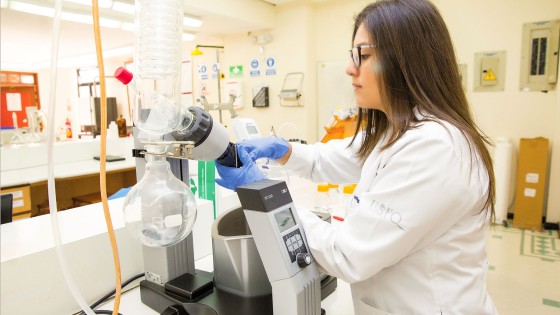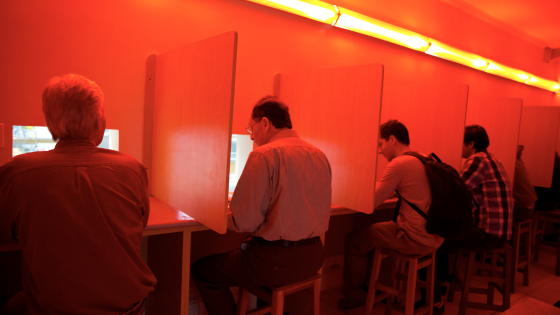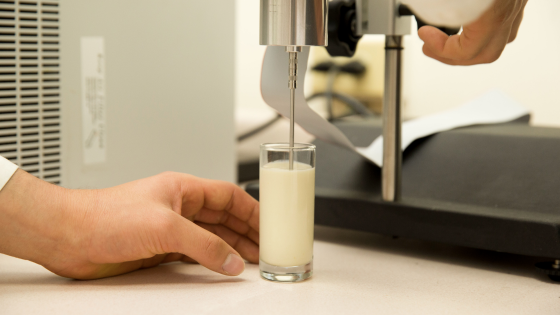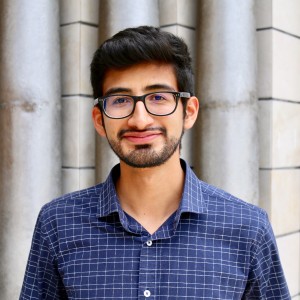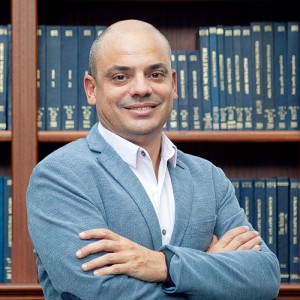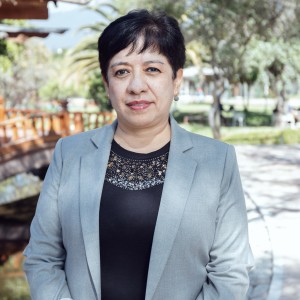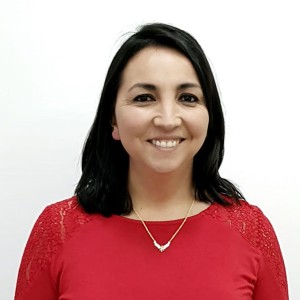Food Engineering
"We optimize processes to transform raw materials into finished products ready for the consumer"
Food Engineering
Food Engineering is a multidisciplinary branch of engineering, which combines the proper selection of raw materials, design and optimization of processes, packaging and distribution, to produce food products that contribute to improving the consumer's quality of life and to satisfy their demand. Throughout this chain, food quality and safety management are maintained. In this program, all aspects of the food sector are studied, from the production stage to the consumption of the final product.
Advantages
- The curriculum design includes all the scientific and technological tools needed for the successful formation of the future professional, in combination with the USFQ Liberal Arts educational model.
- The learning model combines theoretical teaching with the experimental aspect, carried out in fully equipped laboratories.
- There is a pilot food plant with several production lines: dairy, fruit and vegetables, meat, cereals, beer, cookies, and bread.
- Technical visits to different industries maintain the permanent link between industry and academia.
- The management of small groups of students allows to apply a learning method that includes a personalized treatment.
- Faculty with a solid academic background, mostly at the Doctoral level (Ph.D.), plus experience in the food industry in different lines of research.
- Research carried out in the program is frequently presented at various scientific events worldwide and locally, and published in high-impact journals.
- National and international internships complement students’ training.
- International Exchange Programs with the best universities worldwide.
- Scholarships and/or financial assistance options that allow interested students to study at an Ecuadorian university with the same characteristics as some of the best universities abroad.
- High number of graduates in the job market, which confirms the success of the educational model and the significant contribution to the technological and industrial development of Ecuador.
Professional profile
Food Engineering students have a solid background in Food Science and Process Engineering with a complete overview of the food production chain. They are highly qualified to generate and adapt new technologies, optimize processes, analyze raw materials, semi-finished products, and finished products. In addition, they have comprehensive training that will allow them to address the challenges of research and development of new food products, taking into account consumer demand, food safety, and environmental conservation.
Professional Field
Graduates are trained to:
- Design and optimize industrial processes.
- Develop food products.
- Manage food production.
- Create their own food company.
- Be part of research centers.
- Continue postgraduate studies in any country in the world.
Testimonials
"In Food Engineering, not only have I been fully trained in the various fields of knowledge, and enriching myself as a person thanks to the Liberal Arts, but within my specialization, I have met professors who give their all to share their knowledge and experiences within an environment with state-of-the-art laboratories where you can materialize what you have learned in class. I have always liked to understand the why of things and I have been able to take part together with my professors in research projects in the area, which conclude when the results are published in important publications."
- Byron Pérez, Food Engineer (2019) -
"Studying Food Engineering at USFQ has been one of my best life experiences. Having such high-level mentors and professors in my academic training, as well as an adequate infrastructure to acquire all the necessary knowledge, made my five years of studies a constant professional and personal growth. Undoubtedly Liberal Arts based education combined with the study of food science and engineering make this career one of the most interesting and widely applied in the world today."
- Carla Almendáriz, Ph.D. (c). Class of 2011 -
"My career gave me the magical opportunity to combine the art of product development and the technological and scientific knowledge to do so. USFQ not only prepared me to work for one of the world's largest food multinationals professionally, but also as an individual capable of meeting with people from different cultures every day, traveling through various countries, and having the attitude to recognize what I know and what I would like to know. Studying Food Engineering at USFQ is and will always be the best professional decision of my life."
- Luis Andrés Torrico, M.A. Class 2015 -
"The excellent training I received upon graduating as a Food Engineer opened many doors for me in various fields: I held a position of high responsibility in the food industry, I was a USFQ Laboratory instructor for two years and I am currently completing a master's degree with a scholarship of academic excellence, in Nutrition and Food at ETH (Zürich, Switzerland). This is the 6th ranked university worldwide, where Albert Einstein studied and was part of the teaching staff. The contribution of the university, the program, and the extraordinary work and dedication of my professors has been fundamental in all these achievements, in addition to my student and professional merits."
- Andrea Endara, M.Sc. Class of 2016 -
"Our country, in order to compete in a globalized world, must walk towards excellence. To achieve this, in the Food area, cutting-edge technology is combined with food safety and permanent innovation, which is a fundamental part of the training of our students, in addition to their human development. The commitment that USFQ Food Engineering has with Ecuador is to train highly qualified young professionals."
- Lucía Ramírez, Ph.D. Food Engineering Coordinator -
International Accreditation
Documentación
Program Educational Objectives (PEO)
Engineering Professionals
PEO 1: Propose and execute solutions to solve different problems in food industrialization, based on fundamentals and tools of basic sciences, food engineering and related fields, with a positive impact on food sovereignty.
Technical Skills & Values
PEO2: Lead multidisciplinary and collaborative projects through efficient teamwork, with an innovative vision, through product development and process improvement, which contribute to the growth of the productive matrix and respond to national and international advances and needs, with social, environmental and ethical responsibility.
Continuous Learning
PEO3: Pursue a permanent update of knowledge through continuing education programs, professional development, graduate education, and different training in various topics, both human and related to Food Engineering.
Professional Abilities
PEO4: Develop business proposals, become part of the industry, research centers or government entities, to creatively apply Food Engineering and propose alternatives to society's problems.
Student Outcomes (SO)
SO1: An ability to identify, formulate, and solve complex engineering problems by applying principles of engineering, science, and mathematics.
SO 2: An ability to apply engineering design to produce solutions that meet specified needs with consideration of public health, safety, and welfare, as well as global, cultural, social, environmental, and economic factors.
SO 3: An ability to communicate effectively with a range of audiences.
SO 4: An ability to recognize ethical and professional responsibilities in engineering situations and make informed judgments, which must consider the impact of engineering solutions in global, economic, environmental, and societal contexts.
SO 5: An ability to function effectively on a team whose members together provide leadership, create a collaborative and inclusive environment, establish goals, plan tasks, and meet objectives.
SO 6: An ability to develop and conduct appropriate experimentation, analyze and interpret data, and use engineering judgment to draw conclusions.
SO 7: An ability to acquire and apply new knowledge as needed, using appropriate learning strategies.
Academic Faculty

